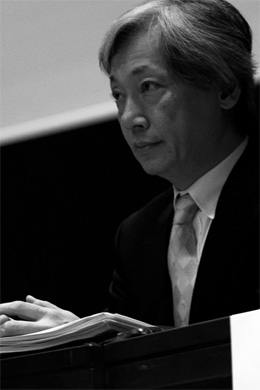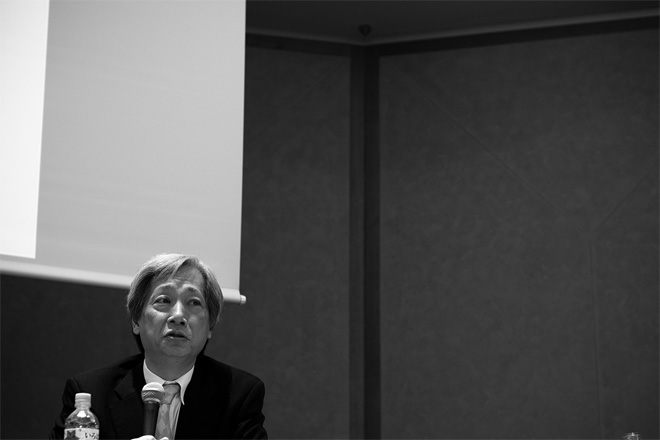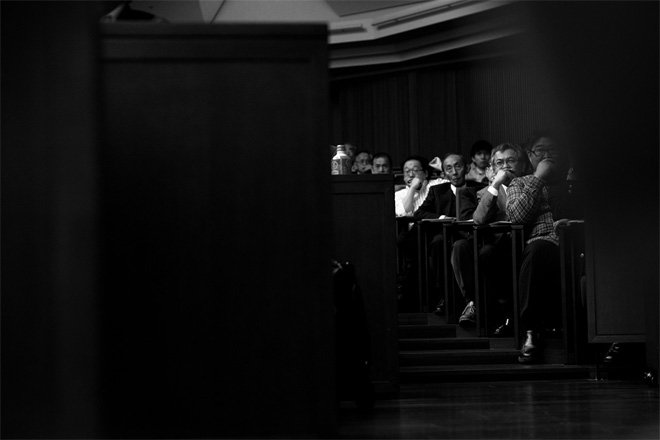Drawing up a blueprint for problem solving in complicated international situations
Kiichi Fujiwara / Professor at University of Tokyo Graduate Schools for Law and Politics

In several areas of the world, countries that are currently subject to collective security due to the collapse of their national governments have become hotbeds for terrorist organizations. This situation presents a serious risk of international tumult and crisis. The role of academics and scholars is to present policies that can anticipate and prevent this potential crisis before a terrorist strike occurs.
─Professor Fujiwara, what topic are you currently most interested in?
Fujiwara: I think that the big subject in current international relations is collective security rather than the issue of whether to recognize the right to collective defense. This is because there are several states in the world where the government has collapsed and lost its ability to rule its territory and the people who live there. These states are becoming hotbeds for radical terrorist organizations. This is currently the situation in Iraq, Syria, Sudan, Yemen, and Somalia. We can see how serious a problem this is when we consider that Al Qaeda has set up bases in Sudan and Yemen.
The issues involved in regions subject to collective security cannot be resolved by military force and aerial bombings alone. This is because part of the problem in these areas is that no one has the authority to rule effectively. Although no internal government is functioning in these lands, it is extremely difficult to impose a government from the outside to substitute reliance on military force. Consequently, we are caught in a situation where no one can interfere. Because other nations’ intentions to participate in these regions are very weak, instability is spreading. I think that this is our biggest problem.
The reconstruction of the requested collective security
Moreover, what I am currently worried about within the cabinet decision-making process in the domestic debate in Japan is that there has been a compromise according to which collective security is not recognized, whereas the right to collective defense has been recognized on a limited basis. Many people are living in places that have been overrun by armed organizations and are in a state of anarchy. Thus, the argument that we should intervene to protect these people has sufficient ethical justification. This is taking responsibility for their security. However, can we actually achieve results using military action if our purpose is to enable these people’s security?
Consider the current situation in Libya, where the UN approved intervention on the basis of this argument. In March 2011, a multinational force intervened in Libya because a genocide was about to occur in Benghazi; however, in the end, the force was quickly withdrawn, and the chaos in Libya continues today. Looking at situations like this one, I believe that the reconstruction of collective security is currently an extremely large challenge.

Taking actions that utilize Japan’s relative predominance
─What can Japan do about this challenge?
Fujiwara: I think that while Japan’s self-defense forces can take on a support role when conducting tactical operations with the US armed forces, we cannot expect much military strength from them. Rather, I believe that the best way for Japan to utilize its relative predominance is to take humanitarian aid actions focused primarily on supporting refugees.
─Syria is a serious issue in terms of refugee support.
Fujiwara: I have presented a variety of arguments since 2013 about what should be done to allow refugees to move from Syria into Turkey in the midst of anxieties about the spread of the civil war in Syria. Turkey objects to having refugees enter its country under the jurisdiction of the UN, and it has not given approval for refugee camps. Thus, I have made suggestions as to what can be done to secure Turkey’s approval. Turkey is a member of NATO (the North Atlantic Treaty Organization), so it would be fortifying its role within NATO if it engaged in military actions to allow the movement of refugees. Therefore, I felt that Japan could apply pressure by indicating its support for refugee camps inside Turkey. The cabinet ministers and government officials of Japan and Turkey reached agreement in this regard last year, but the situation in Syria deteriorated rapidly and has become one that cannot easily be resolved. However, the need for action has only increased further.
The influence of Islamic nations is currently very strong in the northern part of Syria, and there are several bloody battlegrounds. Many of the refugees are in a situation where they cannot move, so I think it is necessary to set small objectives and then actually implement them. For example, I think that to facilitate the movement of these refugees, the identification of targets for aerial bombings would be useful. This type of military action is very different from military actions against hostile combatants, and I think it would be extremely effective despite its simplicity. However, because it would take place in a hotly contested area, such action would be quite sensitive. Japan has been quite involved with the UN refugee camps in Jordan, so I think that Japan should figure out a similar role in the camps in Turkey.

The drawing up of blueprints by specialists
─Professor Fujiwara, it seems that you have spoken with the Japanese government about the expansion of Turkish refugee camps, but in what type of role or position are you making these recommendations?
Fujiwara: I don’t have a particular title; I am simply trying to make useful contributions as an academic scholar. There is a frequent tendency to bring in scholars just as projects are getting started, because the scholars can often point out issues that are likely to become problems before an actual dispute breaks out. I think that a scholar’s job is to recommend ways to handle these problems in advance. Some people wonder if it is acceptable to leave things unfinished, i.e., only discuss the blueprint of the solution. However, I don’t think it can be avoided. I think that specialists are people who draw up blueprints before a project is started and work out the kinds of things that should be done.
